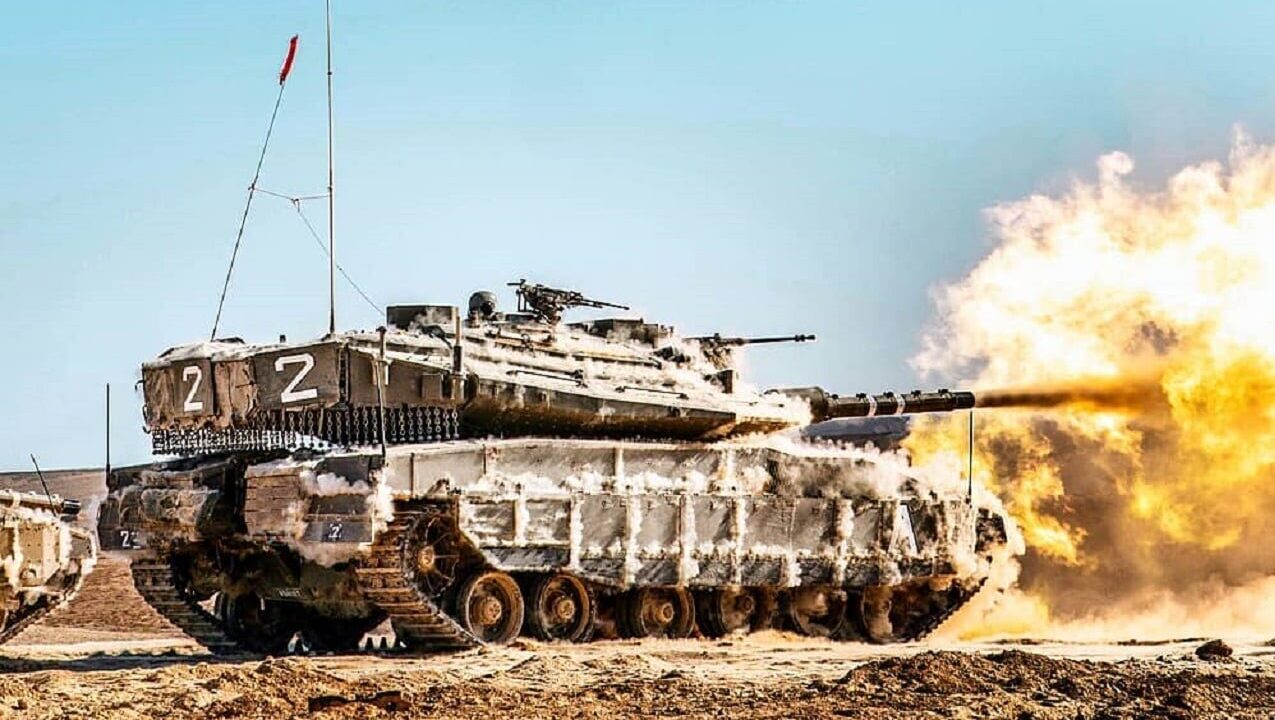During its early existence, the modern State of Israel initially depended on U.S. as well as British tanks and armored vehicles. However, in the mid-1970s, the Israel Defense Forces (IDF) sought to develop a domestically-built tank and the result was the Merkava – which means “Chariot” in biblical Hebrew.
It was designed by General Israel Tal following the armored clashes of the Yom Kippur War and after the failure to purchase Chieftain tanks from the United Kingdom.
The goal of the domestic tank program was to create a platform that could take on Soviet tanks that were in service with many of Israel’s Arab rivals but also to reduce the reliance on foreign arms supplies. The resulting Merkava Mk I was laid out in a rather unorthodox manner compared to contemporary Western and Soviet tanks, featuring a design more akin to some infantry fighting vehicles.
Instead of having the engine at the rear, it was moved in front of the crew compartment, with the turret placed further back on the chassis. The Merkava Mk I entered official service in 1979, and it was used extensively in the 1982 Lebanon War, where it fought against Soviet-made Syrian T-72s in the Bekaa Valley to great success.
Export Options?
Now half a century after it was conceived, there are reports that Israel is in talks to export the Merkava for the first time to two undisclosed countries – one of them in Europe. The potential sale also comes as some NATO member states seek to replenish their armored stockpiles after supplying Ukraine with billions of dollars in arms to fend off the Russian invasion.
Yair Kulas, the head of the ministry’s International Defense Cooperation Directorate — known as SIBAT — told the Calcalist financial paper that his unit was advancing more sales of surplus equipment from the IDF, per a report from The Times of Israel.
“There is a potential of several hundred million shekels there. The world is chasing systems, and production processes require time, and not everyone has the time to wait,” Kulas said, adding “There are two potential countries with which we are holding advanced negotiations [on a sale of the Mervaka tanks]. I am barred from naming them, but one is on the European continent.”
The potential sales would likely include the older Merkava Mark 2, and some of the Merkava Mark 3 tanks, which were first introduced in the 1990s.
It Isn’t Ukraine
It is highly unlikely that Ukraine would be one of the nations receiving the tanks, even as Kyiv has sought to acquire British Challenger 2, German Leopard 2, and U.S. M1 Abrams main battle tanks (MBTs).
Though Israel has provided Ukraine with humanitarian and diplomatic assistance, it has not offered arms, mindful of the need to keep open channels with Moscow given Russia’s clout in next-door Syria, Reuters reported. However, this could still aid Kyiv in a roundabout way.
“European countries are helping Ukraine and supplying it with systems. The stocks in those countries are being emptied, they are renewing them by purchasing more modern and up-to-date systems, and this is where Israeli industries come into the picture,” Kulas told Calcalist.
What Nation?
A number of European nations have donated tanks to Ukraine, so it is hard to speculate on which country may be seeking the Israeli-made Merkava. There would be some irony if the UK were to be the buyer, given that the program was developed after London opted not to sell the IDF the Chieftain. But that is unlikely, even as the British Army has considered purchasing the Leopard 2.
It is also possible that the buyer could be one of the Baltic States of Estonia, Latvia, or Lithuania – even though they haven’t sent any tanks, as those nations have been rapidly increasing their respective arsenals as a show of deterrence to Moscow.
As for the second nation, it is equally unclear who a potential buyer could be – but a shortlist could include Taiwan and India, but also could be Morocco, Bahrain, and the UAE, which have combined acquired some $800 million worth of Israeli military hardware since the signing of the Abraham Accords in 2020.
Israel – A Middle East Arms Powerhouse
Annual Israeli arms sales reached a new record of $12.5 billion in 2022 – double from a decade ago – the Israel Defense Ministry announced Wednesday. Israeli officials noted the demand for Israeli-made weapons due to Russia’s war on Ukraine and an uptick in interest by those Arab nations that recently normalized ties with Israel.
“The remarkable data unveiled by the Israeli defense establishment, reaching new heights in defense exports, showcases the State of Israel’s strength and excellent technological capabilities,” said Minister of Defense Yoav Gallant. “Through the creativity and innovation of both the Israeli defense establishment and the Ministry of Defense, we not only outpace our adversaries but also sustain our qualitative edge.”
Author Experience and Expertise
A Senior Editor for 19FortyFive, Peter Suciu is a Michigan-based writer. He has contributed to more than four dozen magazines, newspapers, and websites with over 3,200 published pieces over a twenty-year career in journalism. He regularly writes about military hardware, firearms history, cybersecurity, politics, and international affairs. Peter is also a Contributing Writer for Forbes and Clearance Jobs. You can follow him on Twitter: @PeterSuciu.
From 19FortyFive
Footage Shows World War I Guns Being Used in Ukraine
‘Vacuum Bombs Destroyed’: Ukraine Footage Shows Putin’s Thermobaric Rockets Destroyed
BOOM! Ukraine Video Shows Precision Strike on Russian Air-Defense System

